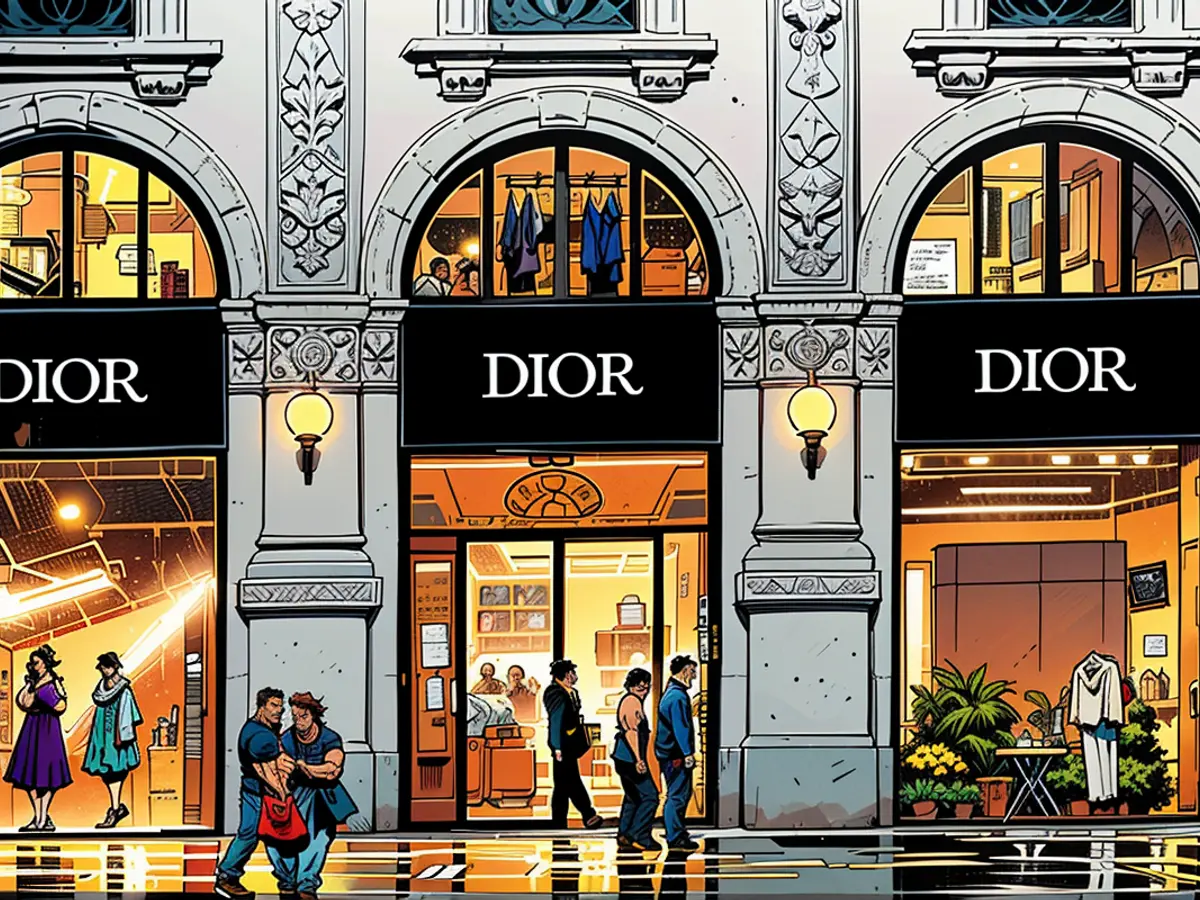Unpaid laborers craft Dior's high-end handbag collection?
In the fashion world, there's no scarcity of reports on worker mistreatment, even within the workshops of high-end fashion brands like Dior. The Milan prosecutor's office is currently scrutinizing this ongoing issue. This isn't an isolated case in Italy.
Once more, a big player in the fashion industry is under the microscope by the Milan prosecutor's office. This time, it's Manufactures Dior, a company part of luxury fashion label Christian Dior Couture. The main concern of the investigators lies in the alleged mistreatment of workers.
LVMH's subsidiary company is accused of outsourcing the production of a portion of its 2024 handbag and accessory collection to external firms. These firms then supposedly handed off the tasks to small businesses, such as Pelletteria Elisabetta Yang Leather Manufacturing, located in Opera, a town near Milan.
Upon inspection of this leather workshop, investigators found 23 laborers, around 18 of whom were from China and 5 from the Philippines. These workers are said to have either worked illegally in the country or lacked employment contracts. They were reportedly made to work more than eight hours a day without pay. Their living and working conditions were said to fall below ethical standards, according to Reuters. These workers were provided with food and a place to sleep above the workshop, ensuring they would always be available as laborers. A bag with the code PO312YKY was allegedly produced there, with a production cost of 56 euros, while it retails for 2,600 euros in stores.
Stunned and Baffled once more on a Large Scale
These incidents of labor violations are nothing new to the fashion industry. Infractions have also been revealed at suppliers for Armani and Alviero Martini. Yet, the shock and confusion are particularly intense in this situation, given that these are renowned global fashion houses, and such revelations tarnish their reputation.
Manufactures Dior is currently under judicial control. Emilio Santoro, Professor of Legal Philosophy at the University of Florence and coordinator of the Research Group Altro Diritto, explains to ntv.de the procedure:
"The procedure involves the prosecutor informing the company about the labor wrongdoings discovered in its supply chain and appointing someone to guide the company through the entire supply chain control process," the professor explains to ntv.de.
And that's it? Is there no sentencing? The answer is no. As long as the company at the beginning of the supply chain cannot prove that it was aware of the mistreatment and possibly profited from it, the prosecutor only has the option of judicial control at their disposal. However, Santoro adds, "the image damage for these companies isn't insignificant."
The issue of worker exploitation is widespread worldwide, but it has particularly plagued Italy for a long time. This is also reflected in the name of the observatory. Placido Rizzotto was a Sicilian labor union leader and politician who was killed by the Mafia in 1948 for advocating for farmers' rights against the poor working conditions.
Though a long-standing problem in the country, the first law against "Caporalato" was not passed until 2011. The term derives from the word "Caporale," which refers to the intermediary between the worker and the employer. The "Caporale" exploits the workers alone or in collaboration with the employer. The 2011 law only criminalized the "Caporale."
A law following in 2016 finally took action on the issue. Since its implementation, a total of 834 investigations have been initiated. Notably, the number of investigations has increased significantly in the last two years. Between 2022 and 2023, 378 new investigations have been added.
Not a problem exclusive to Southern Italy
Contrary to popular belief, investigations have targeted more companies in Northern and Central Italy, contradicting the common stereotype that the problem is mainly southern Italian and only concerns agriculture. While "Caporalato" has primarily taken root in Southern Italy in agriculture, it is found in Central Italy in the manufacturing industry, and in Northern Italy in the service sector.
The higher number of investigations in Northern and Central Italy (456) compared to the South (378) leads to different interpretations: Either more investigations are being conducted there or there are more cases of exploitation. A definitive answer to this question, according to Santoro, does not exist. And there is another question: Has the increased number of investigations also been due to the fact that the victims have filed more complaints?
"This is also a difficult question to answer," Santoro responds. "It depends on what benefits a worker gets from an employment contract. If the most likely outcome is that the company is closed, and one has to find a new job, perhaps under miserable conditions again, then it's better to keep quiet." They needed the security of not being left alone after filing a complaint.
Two major projects that help ensure that victims find work and social integration elsewhere do exist. However, the need for action is far from being met.
Read also:
Despite Italy being known for its fashion industry, instances of mistreatment and exploitation of workers, such as those from China and the Philippines, have been reported in local leather workshops. For instance, laborers at Pelletteria Elisabetta Yang Leather Manufacturing in Opera, near Milan, were reportedly working illegally or without contracts, and were made to work over eight hours a day without pay. This issue is not exclusive to Italy, as labor violations have also been uncovered at suppliers for other renowned fashion houses like Armani and Alvieri Martini.








